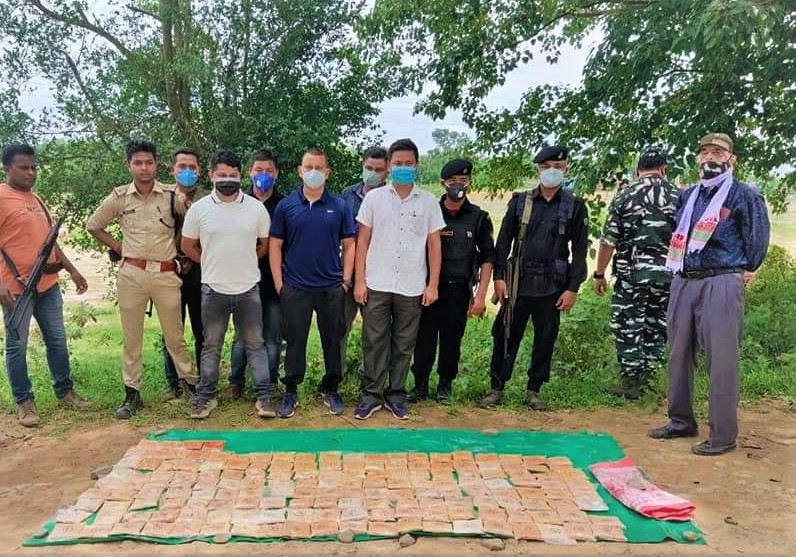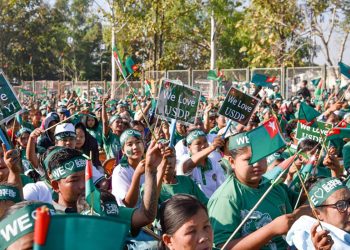Narcotics from Myanmar continue to be smuggled into India’s frontier Northeast region despite a crackdown over the past several months.
The clampdown in Assam, a centrally located state in the region, has gathered steam since May last year. It is one of the Indian states worst affected by drugs.
Between May and December last year, 13 kg of heroin, 265 kg of cannabis, 260,000 tablets including yaba (methamphetamine) and 16,000 bottles of cough syrup (which contains precursor chemicals) were confiscated and as many as 156 criminal cases registered with 368 people arrested. On many occasions, operations by police have also led to the seizure of brown sugar, a type of adulterated heroin, in different parts of the state.
“There has been a marginal decrease in the flow of drugs from Myanmar. Assam Police [have] managed to choke the Imphal-Dimapur-Numaligarh artery, which was most prolific, but there are still many vulnerable routes that crisscross the state,” said Assam police director-general Bhaskar Jyoti Mahanta.
Among the items that have been seized in the Northeast, the heroin, brown sugar and yaba originated in laboratories in Myanmar, while the cough syrup consignments are believed to have been produced at centers in northern India’s Himachal Pradesh and Uttarakhand states.
Some officials believe that most of the heroin and brown sugar from Myanmar is consumed in India’s metropolises, with part of the consignments being smuggled to other countries. In 2019, 14 kg of heroin that came in through Manipur was confiscated in New Delhi. An investigation revealed that the kingpin was a woman identified as Didi who was procuring drugs from Nepal, Myanmar and Bangladesh and delivering them to her contacts in Siliguri.
Yaba and another synthetic variant, brightly colored pills known as “World Is Yours” (WY), are cheaper and simpler to produce than either heroin or brown sugar. They are methamphetamine tablets containing caffeine which can be smoked, snorted, ingested or injected.
Unlike the other items, most of the methamphetamine consignments from Myanmar are smuggled out to Bangladesh through certain zones in Meghalaya, Assam and West Bengal in India’s northeast. According to some estimates, around 2 million yaba tablets are consumed daily in Bangladesh.

Officials have identified three factors triggering an unremitting flow of narcotics from Myanmar into India. A vast stretch of the 1,643-km India-Myanmar border is porous, underdeveloped and hilly. Furthermore, the “free border regime” between the neighbors allows citizens from one country to travel up to 16 km into the other.
Keeping an effective tab on cross-border drug peddling is therefore a daunting task for the Assam Rifles deployed along the Indian side of the border.
Cultivation of opium in the border states of Arunachal Pradesh, Nagaland and Manipur has spiraled in the last decade or so. “It is a profitable venture and the bulk of the produce [is] transported to the laboratories [in Myanmar] that have sprung up at locations not far from the border. And some of these facilities have the tacit support of a section of the [Myanmar] military and insurgents as it means extra income for them,” an official said.
Among these border states, Manipur has been the most affected by the phenomenon. Police and anti-narcotics agencies routinely carry out operations to destroy tracts of poppy cultivation. In 2017-19, police uprooted poppy plants spanning an area of 1,156 hectares.
In Myanmar’s Chin State, which borders the twin states of Manipur and Mizoram in India’s northeast, the area under poppy cultivation has increased as per the Myanmar Opium Survey 2018 published by the United Nations Office on Drugs and Crime (UNODC).
Officials believe that manufacturing drugs at laboratories in Chin State and Sagaing Region is more economical for the drug cartels than in Shan State, in the Golden Triangle.
Assam police chief Mahanta said India’s Narcotics Control Bureau has agreed to install a scanner at Gossaigaon near Assam’s border with West Bengal. The objective is to scan all vehicles and especially trucks that traverse long distances from the northeast to other states in India.
Rajeev Bhattacharyya is a senior journalist in Assam, India.
You may also like these stories:
Myanmar Chin Armed Group’s Rivalry With Indian Rebel Outfits Dates Back Decades
Silent Strike: A Quiet Display of Power From Myanmar’s People
Myanmar’s Military Chief Staged a Coup. But He Did Not Act Alone

















